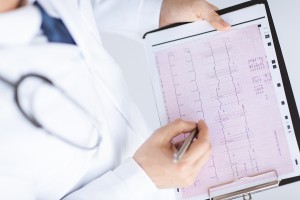 A Stress Echocardiogram is a highly specialised test, and although it involves similar elements to an ordinary exercise test and an echocardiogram, it provides very specific information about the heart in a non-invasive way. It not only increases the accuracy of the stress test in assessing coronary artery disease, but also can be used to provide specific information about valvular disease and pressure in the heart and lungs.
A Stress Echocardiogram is a highly specialised test, and although it involves similar elements to an ordinary exercise test and an echocardiogram, it provides very specific information about the heart in a non-invasive way. It not only increases the accuracy of the stress test in assessing coronary artery disease, but also can be used to provide specific information about valvular disease and pressure in the heart and lungs.
This test is performed in the consulting rooms by a technician and cardiologist. Most tests can be performed within 40 minutes.
A Stress Echo is made up of three parts: A resting Echo study, Stress test, and a repeat Echo while the heart is still beating fast.
Preparing for the Procedure – What do you need to do?
You should dress comfortably for exercise. You should wear a top that you can easily remove and exercise shoes. Fasting is not essential, but it is advisable that you not eat a large meal prior to the test as this may lead to an uncomfortable feeling in the stomach or nausea.
Female patients may not wear a bra during this procedure due to the placement of electrodes, however, you will be covered by a gown at all times.
The Stress Echocardiography Procedure – What happens?
You will be asked to undergo a ‘resting’ echocardiogram. (See page on echocardiography) Several views of the heart are gained by the echo technician. You may be asked to move, breathe slowly or to hold your breath in order to obtain a full set of data.
You will then be asked to step onto the treadmill, where you will undergo the same procedure as for a normal stress exercise test (See Stress Exercise Test).
Immediately after stopping the treadmill, you will move directly to the examination table and lay on the left side. The Echo examination is immediately repeated whilst your heart rate is high.
Note: In patients who are unable to complete a high level of exercise because of physical limitations, stress to the heart is provided by pharmaceutical or chemical stimulation of the heart, but this type of test is usually performed in hospital.
Possible Complications And Risk
There are no known adverse effects from the ultrasound used during Echo imaging. The risk of the stress portion of the test is rare and similar to what you would expect from any strenuous exercise such as jogging in your neighborhood or running up stairs. This is why your cardiologist or another cardiologist is in attendance to manage the rare complications.
Follow-up Care
You will be asked to return to see your cardiologist for a short revisit session where he will discuss the outcome of the tests and your future care. He will also discuss further testing if required.

